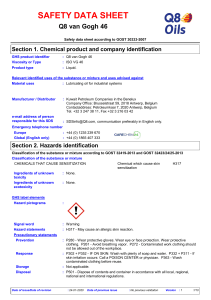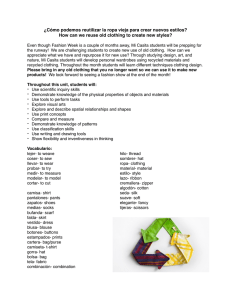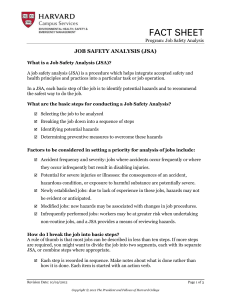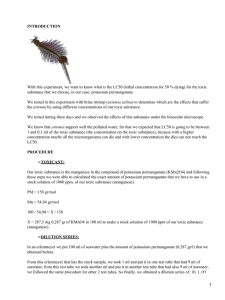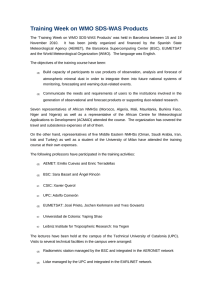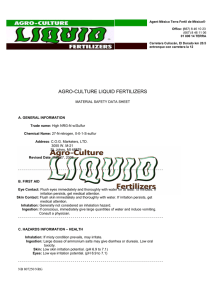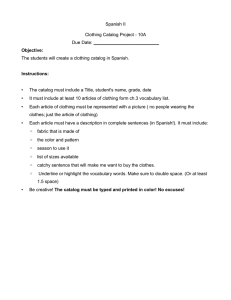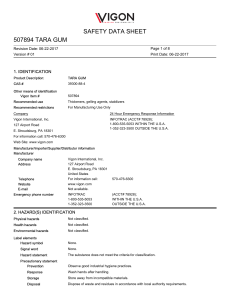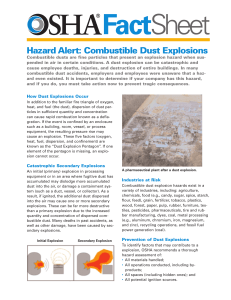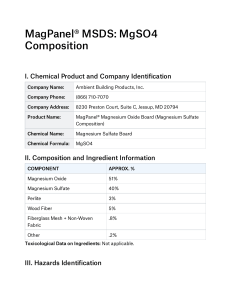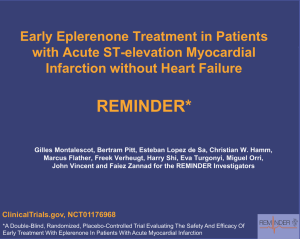Material Safety Data Sheet
Anuncio
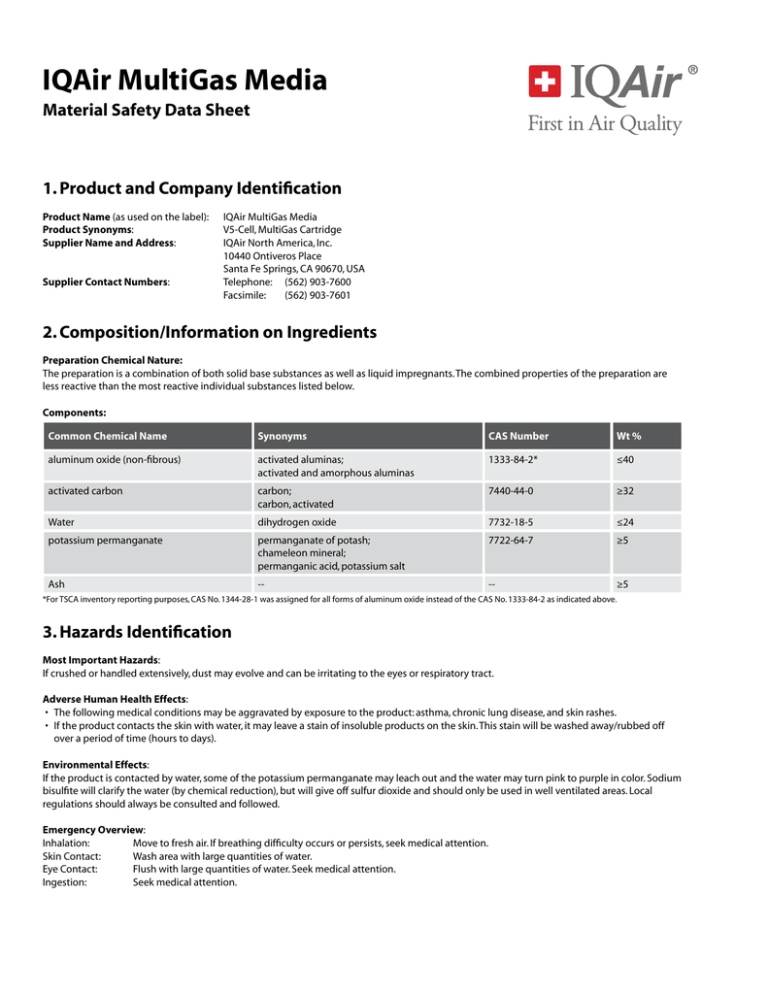
IQAir MultiGas Media Material Safety Data Sheet 1. Product and Company Identification Product Name (as used on the label): Product Synonyms: Supplier Name and Address: Supplier Contact Numbers: IQAir MultiGas Media V5-Cell, MultiGas Cartridge IQAir North America, Inc. 10440 Ontiveros Place Santa Fe Springs, CA 90670, USA Telephone: (562) 903-7600 Facsimile: (562) 903-7601 2. Composition/Information on Ingredients Preparation Chemical Nature: The preparation is a combination of both solid base substances as well as liquid impregnants. The combined properties of the preparation are less reactive than the most reactive individual substances listed below. Components: Common Chemical Name Synonyms CAS Number Wt % aluminum oxide (non-fibrous) activated aluminas; activated and amorphous aluminas 1333-84-2* ≤40 activated carbon carbon; carbon, activated 7440-44-0 ≥32 Water dihydrogen oxide 7732-18-5 ≤24 potassium permanganate permanganate of potash; chameleon mineral; permanganic acid, potassium salt 7722-64-7 ≥5 Ash -- -- ≥5 *For TSCA inventory reporting purposes, CAS No. 1344-28-1 was assigned for all forms of aluminum oxide instead of the CAS No. 1333-84-2 as indicated above. 3. Hazards Identification Most Important Hazards: If crushed or handled extensively, dust may evolve and can be irritating to the eyes or respiratory tract. Adverse Human Health Effects: • The following medical conditions may be aggravated by exposure to the product: asthma, chronic lung disease, and skin rashes. • If the product contacts the skin with water, it may leave a stain of insoluble products on the skin. This stain will be washed away/rubbed off over a period of time (hours to days). Environmental Effects: If the product is contacted by water, some of the potassium permanganate may leach out and the water may turn pink to purple in color. Sodium bisulfite will clarify the water (by chemical reduction), but will give off sulfur dioxide and should only be used in well ventilated areas. Local regulations should always be consulted and followed. Emergency Overview: Inhalation: Move to fresh air. If breathing difficulty occurs or persists, seek medical attention. Skin Contact: Wash area with large quantities of water. Eye Contact: Flush with large quantities of water. Seek medical attention. Ingestion: Seek medical attention. Page 2 - Material Safety Data Sheet IQAir MultiGas Media 4. First-Aid Measures First-aid measures should be taken as indicated below for the following routes of exposure. Inhalation: Skin Contact: Eye Contact: Ingestion: Move to fresh air. If breathing difficulty occurs or persists, seek medical attention. Wash area with large quantities of water. Flush with large quantities of water. Seek medical attention. Seek medical attention. Notes to Physician: Product is expected to be non-toxic and is classified as an eye irritant in the powder form. Treatment is recommended to be symptomatic and supportive. 5. Fire-Fighting Measures Suitable Extinguishing Media: The product is UL Class 1 for flammability (when clean does not contribute fuel when attacked by flame and emits only negligible amounts of smoke). Use fire fighting measures that suit the environment. Specific Hazards: When involved in a fire, the dilute potassium permanganate may liberate corrosive fumes. Protection of Firefighters: Fire fighters should wear NIOSH approved, positive pressure, self-contained breathing apparatus and full protective clothing. 6. Accidental Release Measures Personal Precautions: Protective clothing appropriate for the environment should be worn. Goggles or safety glasses with side shields, NIOSH approved dust masks, rubber or plastic gloves, and full cover clothing covering arms and legs are recommended. Environmental Precautions: See section 3. Hazards Identification, Environmental Effects. Methods for Cleaning Up: Clean up using dry procedures (broom, shovel, etc.); avoid dusting. Recovery: Neutralization: Product may be recovered for use if it has not come in contact with liquid, changed color, or been exposed to significant amounts of gaseous contaminants. See section 3. Hazards Identification, Environmental Effects. Disposal: See section 13. Disposal Considerations. 7. Handling and Storage Handling: Use air conveying (vacuum) for bulk removal. If manual handling is used for transfer (from vessel, slingbags, boxes, or pails), use mechanical ventilation or other measures to remove airborne dust. Technical Measures: The following precautions should be taken when handling the product. a) Prevention of User Exposure: As long as product is handled in V5-Cell, GC or GCX containers rubber or plastic gloves and full cover clothing covering arms is recommended. Goggles or safety glasses with side shields are recommended. NIOSH approved dust masks are recommended. Rubber or plastic gloves are recommended. Full cover clothing covering arms and legs is recommended. IQAir MultiGas Media Material Safety Data Sheet - Page 3 b) Precautions for Safe Handling: • Avoid crushing the product to keep dusting to a minimum. As described under Handling above, mechanical ventilation or other measures may be needed to remove airborne dust. • Protect from water and exposure to contaminated air (gaseous, particulate, and aerosol contaminated), otherwise the product may be rendered useless. Storage: General good storage practices should be followed. Storage Conditions: Suitable Conditions: Incompatible Products: Packaging Materials: Recommended Materials: The following storage conditions should be maintained. Store in a cool, dry area and keep in original, closed containers. Product should be kept protected from water and exposure to contaminated air (gaseous, particulate, and aerosol contaminated), otherwise the product may be rendered useless. The following materials are used and should be used for packaging of the product. These are intended to keep contaminants away from the product. Product is supplied by IQAir in special filter elements and filter cartridges and should be only stored in such. 8. Exposure Controls/Personal Protection Engineering Measures: Minimize eye and skin contact by using appropriate protective equipment. Use local or general room ventilation to control airborne dust that may be generated. Personal Protective Equipment: The following recommendations are made for appropriate personal protective equipment in case of a media spill from the filter elements or filter cartridges. Respiratory Protection: Hand Protection: Eye Protection: Skin and Body Protection: Hygiene Measures: NIOSH approved dust mask Rubber or plastic gloves Goggles or safety glasses with side shields Full cover clothing covering arms and legs. Do not inhale dust and avoid contact with eyes. 9. Physical and Chemical Properties Physical State: Form: Color: Odor: Ph: Temperature of Physical State Change: Flashpoint: Bulk Density: Solubility: Solid Spherical pellets approximately 1.5 – 6.4 mm (1/16 – 1/4 in.) in diameter purple and black No significant odor Not relevant Not relevant Not relevant 0.800 g/cc (50 lb/ft3) Partially soluble in water. Will dissolve in concentrated acids and alkalis. 10. Stability and Reactivity Stability: Stable under normal conditions. Hazardous Reactions: Reactions with gaseous hydrogen chloride or vinyl chloride may produce chlorine. For these applications, the media should be combined with other media for the removal of chlorine gas. Materials to Avoid: Protect from water and exposure to contaminated air (gaseous, particulate, and aerosol contaminated), otherwise the product may be rendered useless. Page 4 - Material Safety Data Sheet IQAir MultiGas Media Hazardous Decomposition Products: When involved in a fire, the dilute potassium permanganate may liberate corrosive fumes. Intended Use and Foreseeable Misuse: Intended use is for air purification from gaseous contaminants. The product is not intended to remove dangerous particulates or biological contaminants. Other media/systems would be required for those. The product is not intended to purify water. 11. Toxicological Information Acute Toxicity: Expected to be non-toxic[1], not tested Local Effects: See section 3. Hazards Identification, Adverse Human Health Effects. Sensitization: Primary skin irritation and corrosivity (rabbits): expected to be non-irritant[1], not tested Eye irritation (rabbits): irritant[1] Primary Route of Entry: Inhalation, ingestion, skin contact, eye contact 12. Ecological Information Not determined. See Section 3. Hazards Identification, Environmental Effects. 13. Disposal Considerations Waste From Residues: New product (media) can generally be disposed of in a landfill. Spent media that has removed toxic chemicals should be examined for specific hazards. Local regulations should always be consulted and followed. Contaminated Packaging: Not relevant 14. Transport Information International Regulations: Proper Shipping Name: Not Applicable Not Applicable 15. Regulatory Information Regulations: This section contains information specifically applicable to the chemical product relative to the following regulations. Local regulations should always be consulted and followed. SARA Title III (Superfund Amendments and Reauthorization Act) Section 302 Extremely Hazardous Substances (40CFR355): Not listed Section 312 Hazard Categories (40CFR370.2): Only expected as Acute (eye irritant), see section 11. Toxicilogical Information. Section 313 Reportable Ingredients (40CFR372): The potassium permanganate portion of the media contains a high percentage (~97%) Manganese Compound as a part of the chemical structure (manganese compounds CAS Reg. No. N/A) and is subject to the reporting requirements of Section 313 of Title III, Superfund Amendments and Reauthorization Act of 1986 and 40CFR372. 16. Other Information Disclaimer: The information contained herein is accurate to the best of our knowledge. We do not suggest or guarantee that any hazards listed herein are the only ones which exist. IQAir North America makes no warranty of any kind, express or implied, concerning the safe use of this material in your process or in combination with other substances. Effects can be aggravated by other materials and/or this material may aggravate or add to the effects of other materials. The user has sole responsibility to determine the suitability of the material for any use and the manner of use contemplated. [1] According to methods described in US Government Document 29CFR1910.1200. 105040001 080221_IQ_SS_GMG_XMG_US
